Unit 6 I'm watching TV单元复习课件(词组+句型+知识点+语法+写作指导+易错考点)
文档属性
| 名称 | Unit 6 I'm watching TV单元复习课件(词组+句型+知识点+语法+写作指导+易错考点) | 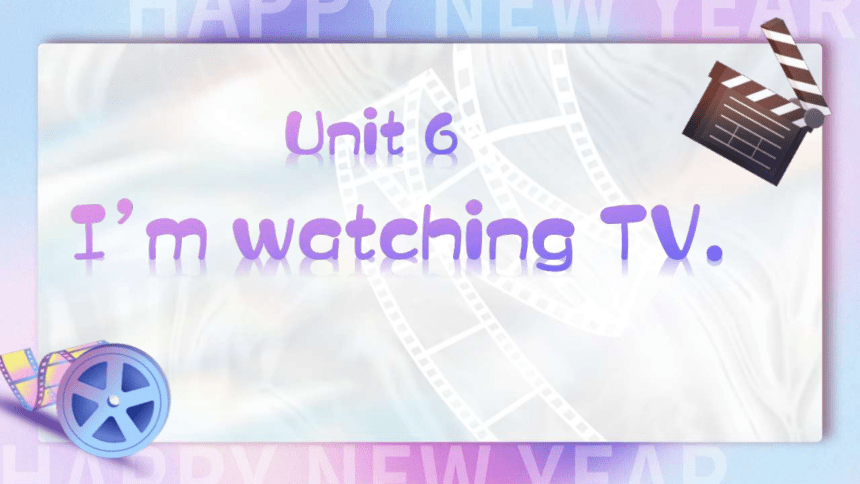 | |
| 格式 | pptx | ||
| 文件大小 | 32.4MB | ||
| 资源类型 | 试卷 | ||
| 版本资源 | 人教新目标(Go for it)版 | ||
| 科目 | 英语 | ||
| 更新时间 | 2024-05-17 16:42:55 | ||
图片预览


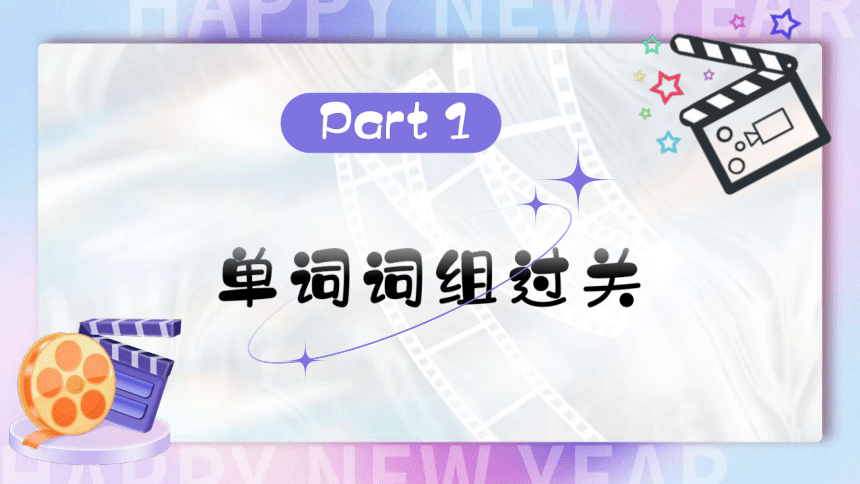
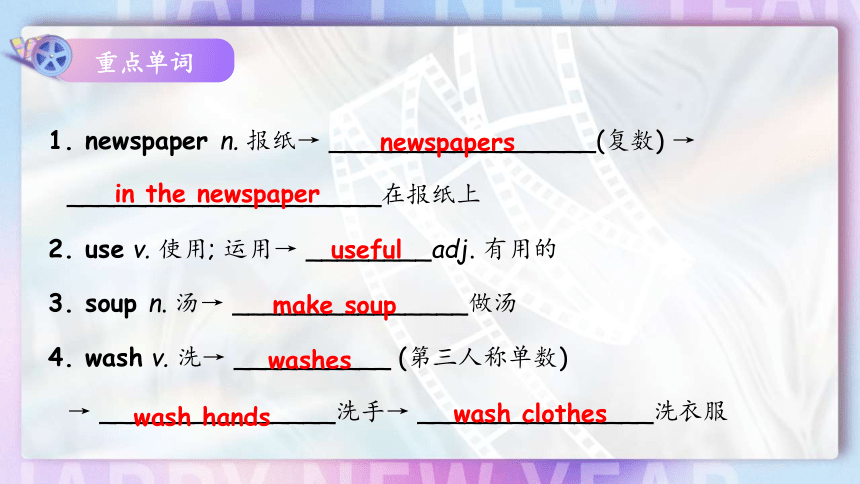
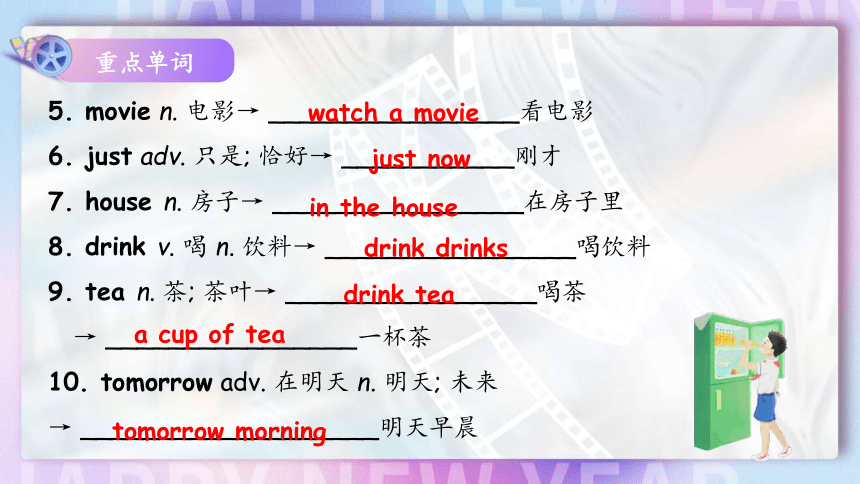
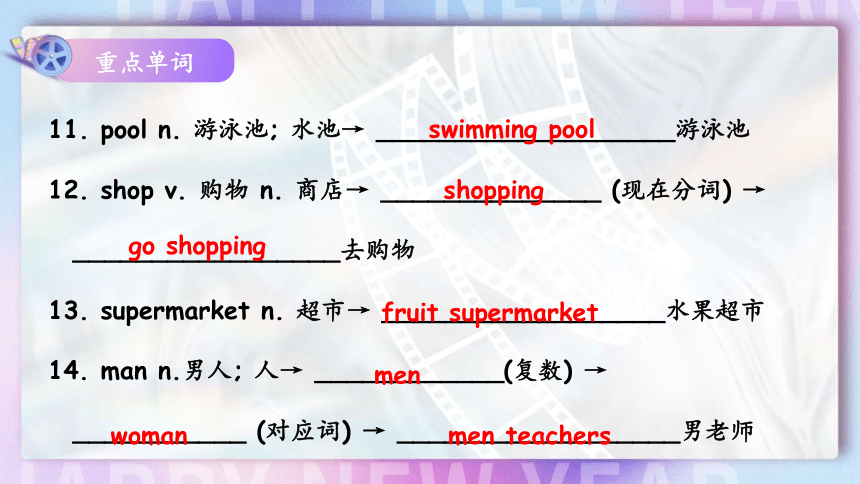
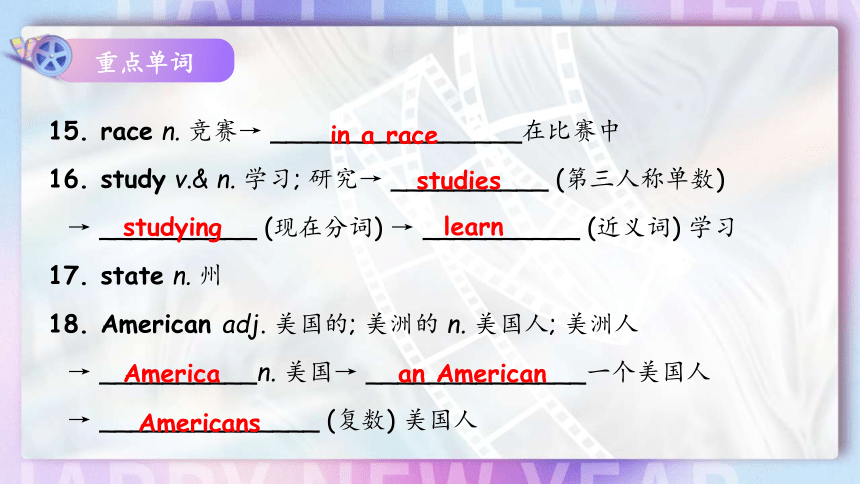
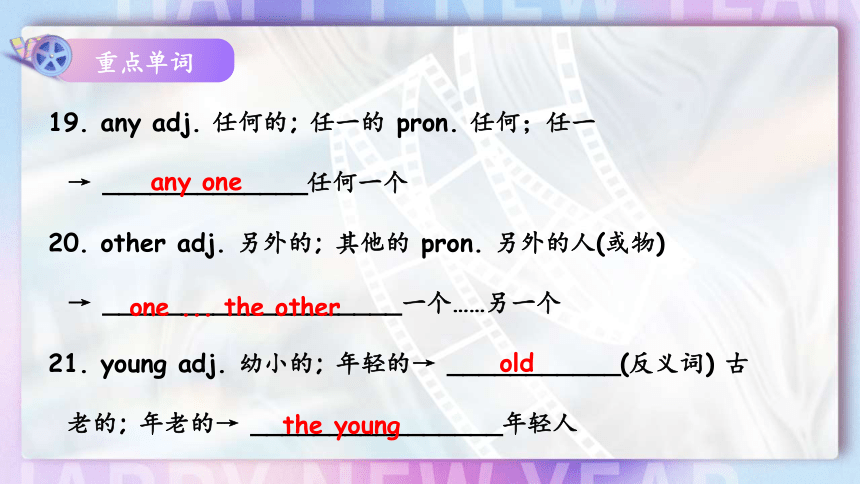
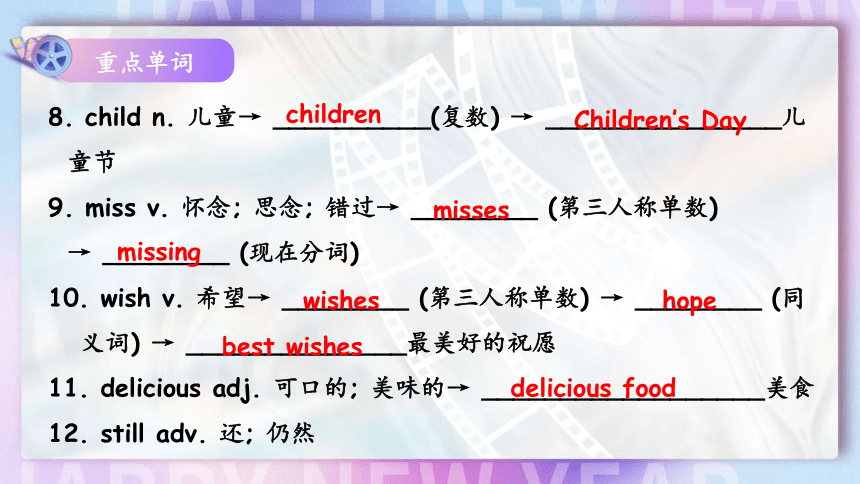
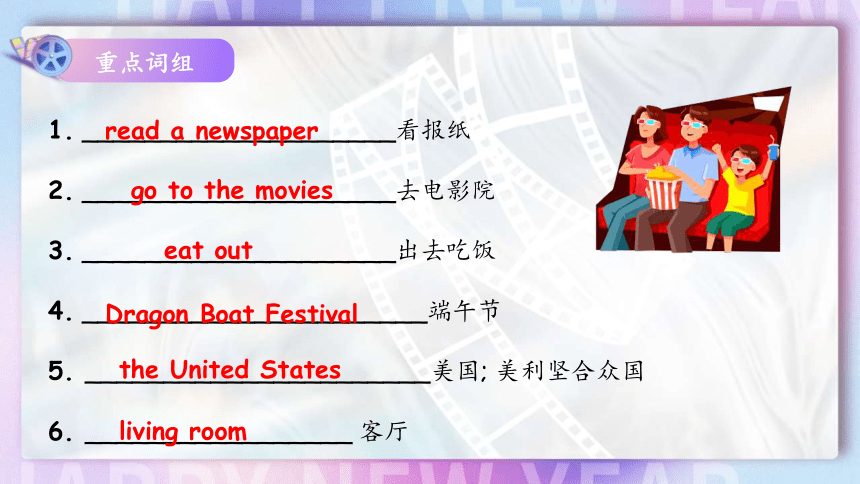

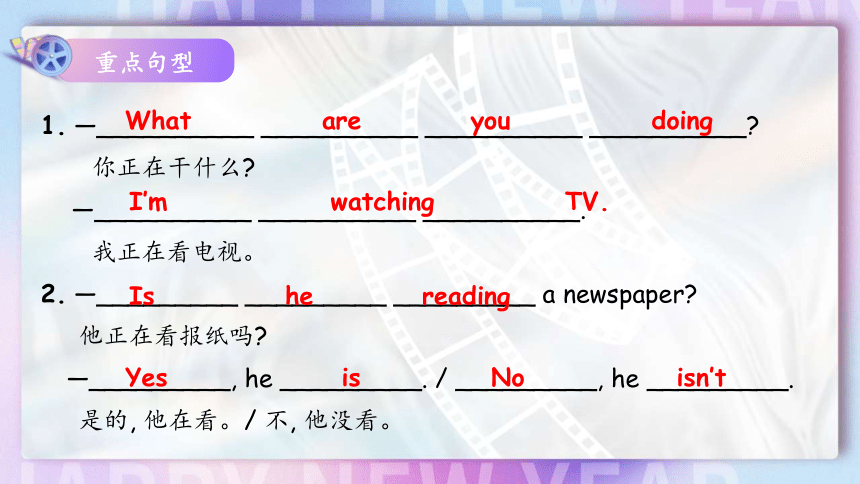
文档简介
(共134张PPT)
单词词组过关
知识点精讲
单元语法专项
重点句型过关
写作指导
易错考点专练
重点单词
1. newspaper n. 报纸→ _________________(复数) → ____________________在报纸上
2. use v. 使用; 运用→ ________adj. 有用的
3. soup n. 汤→ _______________做汤
4. wash v. 洗→ __________ (第三人称单数)
→ _______________洗手→ _______________洗衣服
newspapers
in the newspaper
useful
make soup
washes
wash hands
wash clothes
重点单词
5. movie n. 电影→ ________________看电影
6. just adv. 只是; 恰好→ ___________刚才
7. house n. 房子→ ________________在房子里
8. drink v. 喝 n. 饮料→ ________________喝饮料
9. tea n. 茶; 茶叶→ ________________喝茶
→ ________________一杯茶
10. tomorrow adv. 在明天 n. 明天; 未来
→ ___________________明天早晨
watch a movie
just now
in the house
drink drinks
drink tea
a cup of tea
tomorrow morning
重点单词
11. pool n. 游泳池; 水池→ ___________________游泳池
12. shop v. 购物 n. 商店→ ______________ (现在分词) → _________________去购物
13. supermarket n. 超市→ __________________水果超市
14. man n.男人; 人→ ____________(复数) → ___________ (对应词) → __________________男老师
men
woman men teachers
shopping
go shopping
swimming pool
fruit supermarket
重点单词
15. race n. 竞赛→ ________________在比赛中
16. study v.& n. 学习; 研究→ __________ (第三人称单数)
→ __________ (现在分词) → __________ (近义词) 学习
17. state n. 州
18. American adj. 美国的; 美洲的 n. 美国人; 美洲人
→ __________n. 美国→ ______________一个美国人
→ ______________ (复数) 美国人
in a race
studies
studying
learn
America
an American
Americans
重点单词
19. any adj. 任何的; 任一的 pron. 任何;任一
→ _____________任何一个
20. other adj. 另外的; 其他的 pron. 另外的人(或物)
→ ___________________一个……另一个
21. young adj. 幼小的; 年轻的→ ___________(反义词) 古老的; 年老的→ ________________年轻人
any one
one ... the other
old
the young
重点单词
8. child n. 儿童→ __________(复数) → _______________儿童节
9. miss v. 怀念; 思念; 错过→ ________ (第三人称单数)
→ ________ (现在分词)
10. wish v. 希望→ ________ (第三人称单数) → ________ (同义词) → ______________最美好的祝愿
11. delicious adj. 可口的; 美味的→ __________________美食
12. still adv. 还; 仍然
children
Children’s Day
misses
missing
wishes
hope
best wishes
delicious food
重点词组
1. ____________________看报纸
2. ____________________去电影院
3. ____________________出去吃饭
4. ______________________端午节
5. ______________________美国; 美利坚合众国
6. _________________ 客厅
read a newspaper
go to the movies
eat out
Dragon Boat Festival
the United States
living room
重点句型
1. —__________ __________ __________ __________
你正在干什么
—__________ __________ __________.
我正在看电视。
2. —_________ _________ _________ a newspaper
他正在看报纸吗
—_________, he _________. / _________, he _________.
是的, 他在看。/ 不, 他没看。
What are you doing
I’m watching TV.
Is he reading
Yes is No isn’t
重点句型
5. —_______ _______ _______ the computer
他们正在使用电脑吗
—Yes, they are./No, they aren’t.
是的, 他们在用。/ 不, 他们没用。
6. —_________ _________ _________ _________
你正在做什么
—_________ _________ a book. 我正在看一本书。
Are they using
What are you doing
I’m reading
重点句型
5. —_______ _______ _______ ___________ in a river
那个男人正在河里游泳吗
—No, he isn’t. He’s swimming in a pool.
不, 他没有。他正在游泳池里游泳。
6. —_________ _________ is it in Beijing 北京是什么时间
—It’s eight o’clock in the morning.
是早上八点钟。
Is the man swimming
What time
重点句型
7. Zhu Hui _________ _________ _________ and _________ _________ _________ his mom’s delicious zongzi.
朱辉想念他的家人并希望吃到他妈妈包的美味的粽子。
8. ______________________________.
这是我家的一张全家福。
misses his family wishes
to have
Here is a photo of my family
知识点1:newspaper /nju zpe p / n. 报纸
考向:newspaper 用作可数名词,是一个由news(新闻) 和paper (纸) 构成的复合名词,复数形式是newspapers。
e.g. There is something important in the newspaper.
报纸上有重要内容。
类似的复合名词还有:class+room=classroom 教室
basket+ball=basketball 篮球
bed+room=bedroom 卧室
知识点1:newspaper /nju zpe p / n. 报纸
拓展:read a newspaper = read newspapers“看报纸”。表示看(书、报纸、杂志等) 要用动词read。
e.g. Reading newspapers can help us know about the world.
看报纸可以帮助我们了解世界。
newspaper的其他常用短语:
① in the newspaper 在报纸上
② morning/evening newspaper 晨报/晚报
典型例题
我爸爸正在花园里看报纸。
My father is _________________________________ in
the garden.
reading a newspaper / newspapers
知识点2:on the phone 通过电话
考向:on the phone = over the phone = by phone 意为“通过电话”,其中on 为介词,意为“通过;使用;借助于”。
e.g. Jenny is talking with her friend on the phone.
珍妮正和她的朋友通过电话交谈。
拓展:on 的其他用法:
on 在……上
e.g. There is a book on the desk. 书桌上有一本书。
在( 某一天)
e.g. What do you often do on Sunday 星期天你经常干什么?
关于
e. g. I’m reading a book on South Africa.
我正在看一本关于南非的书。
典型例题
In the last few months, the teachers have given lessons
________ the Internet.
A. for B. at
C. in D. on
知识点3:use /ju z/ v. 使用
词组:use the computer 使用电脑
e. g. If you can use your dictionary, you will learn English better.
如果你能使用你的词典,你的英语会学得更好。
I use the knife to cut the apple.
= I use the knife for cutting the apple. 我用刀子切苹果。
I’ll use this room as my study. 我打算把这个房间用作我的书房。
use 作及物动词,常见用法:
① use sth. 使用某物
② use...to do...
=use...for doing...用……做……
③ use...as... 把……用作……
use 的词形变化:
useful adj. 有用的
useless adj. 无用的
知识点3:use /ju z/ v. 使用
拓展:(1) use up“用尽,用光”。
e.g. Don’t let yesterday use up too much of today.
不要让昨天耗费今天太多。
(2) use 还可作名词,意为“使用,运用”。make good use of ...
好好使用……。
e.g. Everyone should make good use of time.
每个人都应该好好利用时间。
一语辨异:
Use your head and do something
useful, please. It’s useless worrying
about it. 请动动你的头脑,做一些有用的事情。担心它是没 用的。
辨析: use 与 with
use 动词,作谓语,表动作 I use a pen to write.
=I write with a pen.
我用钢笔写字。
with 介词,作状语,表方式 典型例题:The man cuts the tree with a knife. (改为同义句)
The man _______ a knife _______ _______________ the tree.
uses to cut/for cutting
知识点4:wash /w / v. 洗
e.g. Grace wants to wash clothes for her mother today.
今天格雷斯想给她妈妈洗衣服。
After dinner, I often do the dishes (= wash the dishes) with my sister. 晚饭后,我经常和妹妹洗餐具。
I’d like to do some washing this afternoon.
我想今天下午洗衣服。
We should often wash hands. 我们应该常洗手。
wash 的常见用法:
① wash sth. for sb. 为某人洗某物
② do the dishes = wash the dishes
洗餐具
③ do some washing 洗衣服
④ wash hands 洗手
知识点5:go to the movies 去看电影
词组:go to the movies= go to a movie 去看电影
考向:movie 为可数名词,与film (英式英语)同义
e.g. They made an amazing movie with the 5D technology.
他们用5D 技术制作了一部令人惊叹的电影。
知识点5:go to the movies 去看电影
拓展:(1)“go to + 表示活动的名词”意为“去做某事”。
e.g. go to the party 去参加聚会;go to the concert 去听音乐会
(2)“go + 动词的-ing 形式”意为“去进行某一项(休闲或娱乐性的)活动”。
e.g. go fishing 去钓鱼; go shopping 去购物;
go swimming去游泳; go walking 去散步;
go boating 去划船; go dancing 去跳舞。
“去看电影”的表达:
go to the movies (美式)
go to the cinema (英式)
go to watch a movie (美式)
go to see a film (英式)
典型例题
你能和我一起去看电影吗?
Can you _______ _______ _______ _______________
with me
go to the movies/ a movie
知识点6:This is ... (speaking). 我是……
e.g. —Hello! May I speak to Mr. Green, please
你好!请问我可以和格林先生通话吗?
—This is Mr. Green speaking./Mr. Green speaking./Speaking.
我是格林先生。
温馨提示:电话用语中,一般用this 表示 “我”,用that 表示“对方”,而不用“I”或“you”。
拓展: “接打电话”的常用语:
给对方 打电话 Hello, is that... (speaking) 喂,你是……吗?
Hello, this is... (speaking). 喂,我是……
Hello, is ...in 喂,……在(家)吗?
May/Could I speak to... (please)
(请问)我能和……通话吗?
接电话 Who’s that (speaking) 你是谁?
Who’s speaking 谁在讲话?
Hi, ...It’s ...here. 嗨,……我是……
Hello, this is... here. Who’s that 喂,我是……你是谁?
知识点6:This is ... (speaking). 我是……
当接电话的不是对方要找的人时,可用以下用语:
① Hold on, please.请稍等。
② Hold on for a moment/minute, please.请稍等一下。
③ Sorry, he isn’t in right now. 对不起 ,他此刻不在(家)。
④ May/Can/Should I take a message for...
我能给……带个口信吗?
典型例题
— This is Annie speaking. May I speak to Sally
—_______ I can take a message for you.
A. I hope not. B. I’m sorry to hear that.
C. Sorry, she isn’t here now. D. Have a good day.
【点拨】I hope not. 我希望不是;I’m sorry to hear that. 听到这个消息我很难过;Sorry, she isn’t here now. 对不起,她现在不在这儿;Have a good day. 祝你有愉快的一天。根据“I can take a message for you.”可知萨莉现在不在这儿。
知识点7:Not much 没什么事
e.g. —What are you going to do this evening
你今晚要做什么?
—Well, not much/nothing much. 嗯,没什么事。
温馨提示:Not much 交际用语。还可说成nothing much,用来作为对方询问“做什么”的回答,表示自己有空。
知识点7:I’d love to. 我愿意。
考向:是“I would love to.”的缩写形式。“I’d love to.”经常用于礼貌地接受他人邀请,常用来回答“Would you like to... ”提出的问题。
温馨提示:“I'd love to.”相当于“I'd like to.”,后者语气较前者稍弱。
e. g. —Would you like to play football with me
你想要和我一起踢足球吗?
—Yes, I’d love/like to. 是的,我愿意。
—I’d love/like to,but I’m too busy. 我愿意,但是我太忙了。
—Shall we go to watch the football game tonight
我们今晚去看足球赛,好吗?
—Sorry, I’m afraid I can’t. Because I still have lots of homework to do.
抱歉,我恐怕不能,因为我还有好多家庭作业要做呢。
当委婉拒绝他人邀请时,英语中多用
①“I’d love to,but...”
②“Sorry, I’m afraid I can’t.
Because...”等。
典型例题
—Do you want to watch the basketball game in the park
—________, but I have to do the chores first.
A. I’m afraid not B. I’d love to
C. Never mind D. Of course not
【点拨】用情景交际法。I’m afraid not 恐怕不是;I’d love
to 我愿意;Never mind 没关系;Of course not 当然不。由“but I have to do the chores first”可知,此处是表示肯定的意愿“我很乐意”,但是要先做家务。
知识点8:drink /dr k/ v. 喝 n. 饮料
考向①:drink 作及物动词,意为“喝”;
作不及物动词,意为“喝;喝酒”,后面不接宾语。
e.g. Would you like to drink a cup of milk
你想要喝一杯牛奶吗?
It’s dangerous to drive after drinking.
酒后驾车很危险。
知识点8:drink /dr k/ v. 喝 n. 饮料
考向②:drink 用作名词,意为“饮料”,一般情况下用作不可数名词,表示饮料的种类和份数时用作可数名词。
e.g. Let’s buy some drink for the party.
让我们为聚会买些饮料吧。
Visitors can buy food and drinks in the center.
游客可以在这个中心购买食物和饮料。
英语中不同的“喝”法:
① drink tea/milk/wine/beer/coffee
喝茶/ 牛奶/ 酒/ 啤酒/ 咖啡
② eat soup 喝汤
典型例题
喝水对我们的身体有好处。
It’s good for us to ___________________.
drink/ have water
知识点9:tea /ti / n. 茶;茶叶
e.g. I’d love a cup of tea, thanks.
我想要一杯茶,谢谢。
一杯……
各种茶:
① green tea 绿茶 ② black tea 红茶
③ lemon tea 柠檬茶 ④ iced tea 冰茶
知识点10:shop / p/, / ɑ p/ v. 购物 n. 商店
考向①:作动词,shop for sth.“购买某物”。shop 的动词-ing 形式为shopping。
e.g. They want to shop for some fruit.
他们想去买一些水果。
考向②:作名词,意为“商店”,指规模较小的商店。
e.g. There are lots of shops in the street.
在这条街上有很多商店。
shop 的常用短语:
go shopping 去购物
do some shopping 买一些东西
shopping center 购物中心
shopping list 购物清单
shopping bag 购物袋
典型例题
We used to buy things in the ______, but now we usually do it
online.
A. shop B. museum
C. bank D library
知识点11:man /m n/ n. 男人;人
考向:man 用作可数名词,复数形式是men。
e.g. A man in black clothes jumps high into the air.
一个身穿黑色衣服的男人跳到了高空中。
She was a brave and wonderful woman.
她是一个勇敢而出色的女人。
拓展:(1) man 还可作不可数名词,意为“人类”。
e.g. This is one of the wonders known to man.
这是人类已知的奇迹之一。
(2) man, woman 用于名词前作定语时,其单复数形式与所修饰的名词的单复数形式一致,即man 或woman作定语构成的名词短语变复数时,man 或woman 及名词都要变为复数形式。
e.g. a woman writer 一位女作家
→ some women writers 一些女作家
典型例题
Three-fifths of the teachers in our school are _____.
A. man teachers B. men teachers
C. woman teachers D. women teacher
【点拨】用语法分析法。由主语Three-fifths of the teachers 可知,应用teachers;man/woman作定语时,要和后面的名词在数上保持一致。
知识点12:study /st di/ v. 学习; 研究
辨析:study 与learn
study 侧重于学习的过程。用于表示较高深或周密的“研究”。
learn 侧重于学习的结果,意为“学会”,用于初级阶段的学习。learn from sb. “向某人学习”;learn by oneself“自学”。
知识点12:study /st di/ v. 学习; 研究
e.g. He is studying the math problem.
他正在研究这个数学问题。
He learns English on the radio.
他通过收音机学英语。
We should learn from Lei Feng.
我们应该向雷锋学习。
知识点12:study /st di/ v. 学习; 研究
拓展:study 还可用作名词,意为 “学习;研究;书房”。
e.g. After breakfast, they start their work and study.
早饭后,他们开始工作和学习。
A study shows that good habits are important.
一项研究表明好习惯很重要。
My father is reading newspapers in his study.
我爸爸正在书房里看报纸。
典型例题
The friends ______ from each other and they both ______
very hard.
A. study; learn B. study; study
C. learn; study D. learn; learn
知识点13:race /re s/ n. 竞赛; 比赛
辨析: race 与game
race 通常指速度方面的比赛, 如赛车、赛马等。 a horse race 赛马
a 10-mile race 10英里赛跑
辨析: race 与game
game 指决定胜负的游戏, 通常有一定的规则, 凡参加者均需遵守, 多用于美式英语。英式英语则用match, 此时game 与match可以互换。 a football game/match
足球赛
a basketball game/match 篮球赛
game用复数形式时, 也可指大型的国际体育运动会、比赛等。 the Olympic Games
奥林匹克运动会
知识点14:any other 任何其他的
考向:“any other + 可数名词单数形式”意为“(除了某个以外) 任何其他的……”,指在同一范围内除了某人或某物以外的其他人或物。
易错点:
① “any other+ 可数名词单数”指同一范围内的任何一个人或物。
② “any+ 可数名词单数”指不是同一范围内的任何一个人或物。
知识点14:any other 任何其他的
e.g. Mary is taller than any other girl in her class.
玛丽比她班上的任何一个女生都高。
Mary runs faster than any girl in her brother’s class.
玛丽比她哥哥班上任何一个女生跑得都快。
在同一范围
不在同一范围
典型例题
China is the biggest country in Asia.(改为同义句)
China is bigger than _________ ________ country in Asia.
any other
知识点14:any other 任何其他的
辨析: any 与some
any 与可数名词单数连用,用于肯定句,表示“任一的;任何的”;与不可数名词或复数名词连用,用于否定句和疑问句中代替some。
some 与可数名词复数或不可数名词连用,一般用于肯定句中;若用于疑问句中,则表示委婉请求或建议或期望得到肯定回答。
知识点14:any other 任何其他的
e.g. We should face any difficulty with a brave heart.
我们应当以勇敢的心面对任何困难。
There isn’t any food at home. 家里没有食物。
Are there any students in the classroom now
现在教室里有学生吗?
I have some books. 我有一些书。
Would you like some tea 你想喝点茶吗?
易错点:
在表示委婉请求或建议或希望得到对方肯定回答的疑问句中some不能改为any。
知识点14:any other 任何其他的
拓展:any 还可用作代词,意为“任何;任一”。
e.g. Here are three books. You can read any.
这儿有三本书,你可以读任何一本。
易错点:
other 前还可用限定词the, no, some等。
e.g. no other friends 没有其他朋友
some other books 其他一些书
典型例题
Jeff does some volunteer work in the community every month. (改为一般疑问句)
_________ Jeff do _________ volunteer work in the community every month
Does any
知识点15:other的用法
考向:other / (r) / adj. 另外的; 其他的pron. 另外的人(或物)
“其余的(人或物)”,后接可数名词复数。
e.g. I can see some other boys. 我可以看到一些其他的男孩。
拓展:other 作代词,意为“另外的人(或物)”,常以复数形式others 出现。
e.g. Her marks were higher than others.
她的分数比其他人的高。
典型例题
Some people are too shy to say a word in public. However,
_______ aren’t.
A. another B. the other
C. others D. the others
【点拨】用语法分析法。句意为“一些人在公共场所太害羞了而不能说话。然而,另一些人不这样”。“一些……,另一些(并非全部)……”,应用“some... others...”
知识点16:young /j / adj. 幼小的;年轻的
考向:既可作定语,也可作表语。反义词为old(老的;年纪大的)。youth 意为“青少年时代”。
e.g. His brother is a young teacher.
他哥哥是一名年轻的老师。
My mother looks young. 我的妈妈看起来很年轻。
This movie is for the young and the old.
这部电影老少皆宜。
老少
the+形容词表示一类人:
the young 年轻人 the old 老人 the rich 富人 the poor 穷人
知识点17:children /'t ldr n/(单数:child /t a ld/) n. 儿童
e.g. The children are playing soccer.
孩子们正在踢足球。
Is it OK to lie to a child
对一个孩子撒谎可以吗?
We have a great time on Children’s Day.
在儿童节我们玩得很开心。
children 的名词所有格是在词尾直接加“’s”。
典型例题
_____________(child) should accept gifts from their elders
with both hands.
Children
知识点18:miss /m s/ v. 怀念;思念
考向①: miss 作及物动词,意为“错过”。miss doing sth. 意为“错过做某事”。
e.g. He arrived too late and missed the train. 他到得太晚,错过了火车。
She missed going to the party on Saturday. 星期六她没能出席聚会。
考向②:作名词,首字母大写,即Miss,意为“小姐,老师”,常用于未婚女性的姓氏前。
e.g. Miss Sun is our English teacher. 孙老师是我们的英语老师。
典型例题
Don’t _______ the chance when you can catch it, or you will
regret(后悔).
A. guess B. miss
C. remember D. allow
知识点19:wish /w / v. 希望
辨析: wish 与hope
wish wish sb. sth. 祝某人…… e. g. We wish you a happy weekend.
我们祝你周末愉快。
wish (sb.) to do sth. 希望(某人)做某事 e. g. I wish (you) to go.
我希望(你)去。
wish+that 从句, 表示难以实现的愿望 e. g. I wish I could fly like a bird.
我希望我能像一只鸟一样飞。
当祝愿讲时常用复数形式wishes。
辨析: wish 与hope
hope hope to do sth. 希望做某事 e. g. We hope to see you again.
我们希望再次见到你。
hope + that 从句,表示可以实现的愿望 e. g. I hope (that) my students can learn more about the China Dream. 我希望我的学生能多了解些“中国梦”。
wish 可用于wish sb. to do sth. 的结构,而hope 不可以这样用。
拓展:wish 的其他用法:
wish v. 祝愿 wish sb. sth. 祝愿某人某事
e.g. Wish you a happy birthday! 祝你生日快乐!
n. 希望;祝愿
e. g. Please give my best wishes to your parents.
请把我最美好的祝愿带给你父母。
e.g. He wishes his father to buy a new car. = He hopes that his father can buy a new car. 他希望他父亲买一辆新车。
典型例题
Boys and girls, good luck and wish you _______ good grades
in a new year.
A. get B. getting C. to get
【点拨】用固定搭配法。wish sb. to do sth. “希望某人做某事”。
知识点20:still /st l/ adv. 还;仍然
考向:still 表示动作或状态仍在继续,多用于肯定句或疑问句中,常用来修饰形容词、副词、动词或形容词、副词的比较级。
e.g. The old watch is still beautiful. 这块旧手表依然很漂亮。
Are you still learning online courses
你还在学习网上课程吗?
I still don’t understand. 我仍旧不明白。
知识点20:still /st l/ adv. 还;仍然
拓展:still 还可用作形容词,意为“静止的;不动的”。
e.g. The trees are still in the sun. 这些树在阳光下一动不动。
still 有时也可用于否定句中,此时,它要放于否定的助动词之前
典型例题
They are not young any more, but they are _______ beautiful.
A. even B. still
C. never D. often
现在进行时(一)
定义 表示现在(说话瞬间)正在进行或发生的动作,也可表示当前一段时间内的活动或现阶段正在进行的动作。
构成 由“be 动词+ 动词的-ing 形式” 构成,主语为“I”用am,“you”用are,第三人称单数(he, she, it) 用is,复数人称都用are。①
现在进行时(一)
句 式 变 化 肯定句 主语+ be + v.-ing 形式+ 其他. ②
否定句 主语+ be + not + v.-ing 形式+ 其他. ③
一般疑问句 Be+ 主语+ v.-ing 形式+ 其他?
肯定回答:Yes, 主语+ be. / 否定回答:No,
主语+ be + not. ④
特殊疑问句 特殊疑问词+ be +主语+ v.-ing 形式+ 其他?⑤
疑问词Who + be + v.-ing 形式+ 其他?⑥
现在进行时(一)
现在进行时 动词-ing 的变化规则⑦ 使用场合 题干中有look, listen, now 等标志词时用现在进行时。⑧
通过上下文提示可知动作正在进行。如:“It’s ten o’clock.” “Look at the picture.” “Be quiet!” 以及“these days/months/years”和“this month”等,表示当前一段时间内正在进行的动作或现阶段正在进行的动作。⑨
现在进行时(一)
现在进行时 特殊用法 [难点] 现在进行时与always 连用表示反复出现或习惯性的动作,有强烈的感彩。⑩
一些表示动作转移的动词可以用现在进行时表示将来,表示最近按计划或安排要进行的动作。这样的动词主要有go, come, begin, start, leave, fly 等。
现在进行时(一)
现在进行时 特殊用法 [难点] 现在进行时与always 连用表示反复出现或习惯性的动作,有强烈的感彩。⑩
一些表示动作转移的动词可以用现在进行时表示将来,表示最近按计划或安排要进行的动作。这样的动词主要有go, come, begin, start, leave, fly 等。
考点1:现在进行时的构成
考向:由“be 动词+ 动词的-ing 形式” 构成,主语为“I”用am,“you”用are,第三人称单数(he, she, it) 用is,复数人称都用are。
e.g. I’m watching the World Cup. 我正在看世界杯。
My sister is talking on the phone. 我姐姐正在打电话。
They are listening to music. 他们正在听音乐。
考点2:现在进行时的句式变化
肯定句:主语+ be + v.-ing 形式+ 其他.
e.g. She is/I am/They are watching TV.
她/ 我/ 他们正在看电视。
否定句:主语+ be + not + v.-ing 形式+ 其他.
e.g. Tina is not riding a shared bike.
蒂娜没有在骑共享单车。
考点2:现在进行时的句式变化
e.g.—Is Dave swimming in the river 戴夫正在河里游泳吗?
—Yes, he is./No, he isn’t.
是的,他在游泳。/ 不,他没有游泳。
一般疑问句:Be+ 主语+ v.-ing 形式+ 其他?
肯定回答:Yes, 主语+ be.
否定回答:No,主语+ be + not.
考点2:现在进行时的句式变化
特殊疑问句:特殊疑问词+ be +主语+ v.-ing 形式+ 其他?
疑问词Who + be + v.-ing 形式+ 其他?
e.g.What is she doing at home 她正在家做什么呢?
Who is reading English 谁正在读英语?
现在进行时用法
现在进行时,动作正发生;
be+doing是结构,am/is/are要主语行;
否定be 后加not,一般问句be 前横;
特殊问句问动作,what一马当先往前冲。
典型例题
1.Tim is reading Journey to the West.(改为否定句)
Tim __________ __________ Journey to the West.
2.The students are taking notes now. (改为一般疑问句)
_________ the students _________ notes now
isn’t reading
Are taking
考点3:动词-ing 的变化规则
一般直接在动词后+-ing look-looking, go-going,
visit-visiting. . .
以不发音的字母e结尾的 动词, 去e+-ing come-coming, make-making,
take-taking, have-having,
dance-dancing, give-giving. . .
以辅音字母+y结尾的动词, 直接+-ing study-studying, fly-flying,
cry-crying, carry-carrying. . .
考点3:动词-ing 的变化规则
以重读闭音节结尾且末尾只有一个辅音字母的动词, 双写辅音字母+-ing get-getting, shop-shopping,
swim-swimming, put-putting,
begin-beginning, run-running,
cut-cutting. . .
以ie 结尾的重读开音节词, 变ie为y+-ing die-dying, lie-lying, tietying. . .
典型例题
1.—Excuse me, what is Nick doing
—Look! He _______ flowers outside.
A. waters B. watered
C. is watering D. has watered
2.Some students _______ Taiji over there. Let’s go and join them.
A. play B. played C. are playing D. were playing
考点4:现在进行时与always 连用的比较:
e.g. You are always forgetting your homework.
你总是忘记你的家庭作业。
be always doing sth. “总是/ 一直做某事”,含有赞赏、厌恶等感彩。
always do sth. “总是做某事”,陈述事实,不带感彩。
考点5:现在进行时和一般现在时的区别
现在进行时和一般现在时的区别 概念不同 现在进行时:表示说话时(瞬间)正在进行的动作,也表示现阶段一直进行的动作。①
一般现在时:表示经常性或习惯性的动作或存在的状态,也表示说话者的能力,还表示自然现象。②
现在进行时和一般现在时的区别 构成不同 现在进行时:由“be 动词+ 动词的-ing 形式”构成。③
一般现在时:谓语构成主要有四种形式:系动词be(am, is, are); 实义动词原形;实义动词的第三人称单数形式;情态动词+ 实义动词原形。④
时间状语 不同 现在进行时: now, these days 等。⑤
一般现在时: every day/morning, in the morning/ afternoon/ evening 等短语。⑥
典型例题
—Jim, I’ve got a problem with my car. Could you help me
—Sorry, not right now. I _______ a short video.
A. make B. have made
C. am making D. was making
典型例题
If you heat ice, it _______ into water.
A. turns B. turned
C. was turning D. has turned
【点拨】用常识法。冰加热变成水,为客观事实,用一般现在时态。
今天是周末,你们一家人相聚家中,并且正在进行着不同的活动:爸爸和弟弟在院里种树、妈妈在打扫房间、姐姐在看书、你在上网课。
请根据以上提示,写一篇英语短文,对你们的活动进行描述。
要求:1. 词数:70 左右;
2. 语句通顺、内容详实,可适当发挥。
单元话题
1. 注意时态用现在进行时。
2. 注意使用过渡句使文章衔接自然。
3. 注意句式的灵活多样。
4. 正确使用人称——第一人称和第三人称。
审题指导
“4W1H 法”描述事件
写作话题是描述故事或正在发生的事件时,可使用4W1H 法,通过对时间(When)、地点(Where)、人物(Who)、事件或活动(What)和人物的感觉或评价(How)等要素进行叙述。
写作方法
写作模板
“4W1H”法 描述事件 开篇点题 (when) It’s... What are...doing
具体活动 (where, who, what) We are all...
My father is...
Is my brother...
What are my mother and ...
What am I doing I am...
总结全文 (how) How busy we are! We are all having a great time.
经典词句
单词 plant, clean, read, have
短语 plant a tree, clean the room, read a book, take an online class
句子 ① It’s 10 o’clock in the morning.
② What are my family doing
③ Is my brother planting a tree, too
④ Yes, he is helping my father.
⑤ How busy we are!
⑥ We are all having a great time.
It’s 10 o’clock in the morning. What are my family doing
We are all at home. My father is planting a tree. Is my brother planting a tree, too Yes, he is helping my father. What are my mother and my sister doing Oh, my mother is cleaning the room and my sister is reading a book. What am I doing I am taking an online class!
How busy we are! We are all having a great time.
范文赏析
本文运用“4W1H 法”描述事件。结构严谨、语言流畅、要点全面、叙述有条理。
第一:明确了时间“when”(10 o’clock in the morning)。
第二:点明了地点“where”(at home)。
名师点评
第三:介绍了具体人物 “who”和各自的活动“what”(包括了所有人和所有活动)。
第四:表达了感受“how”。
添彩点:①以时间开头,以设问引入话题。②运用现在进行时,按照提示内容逐个描述家人的活动,特殊疑问句和一般疑问句交叉使用,过渡自然。③结尾用感叹句抒发了情感。
名师点评
假如现在是晚上七点钟,你班的美国留学生Jenny在微信上询问你们一家人在干什么,她是否适合在此时拜访。请你根据下表提示给Jenny回复,告诉她你们全家人的活动并欢迎她的到来。
写作任务
家庭成员 我 弟弟 妈妈 爸爸 奶奶
活动 读书 写作业 清洗餐具 喝茶 看电视
要求: 1. 回复内容要包含表格提供的信息,可适当发挥;
2. 不少于60词。
Hi, Jenny. Welcome to my home.
写作任务
家庭成员 我 弟弟 妈妈 爸爸 奶奶
活动 读书 写作业 清洗餐具 喝茶 看电视
写作思路
表达欢迎
再次欢迎
Welcome to my home.
I→ read a storybook.
my brother→ do homework
my mother→wash the dishes
my father→drink tea
my grandma→watch TV
具体描述
I think you can come now...
范文赏析
Hi, Jenny. Welcome to my home. All of my family are at home now. I’m reading an interesting storybook in the study. My brother is doing his homework in the study. He has a lot of homework every day, and he works very hard. My mother is washing the dishes in the kitchen. My father is drinking tea and reading a newspaper in the living room. What about my grandma? Oh, she is watching TV, sitting on the sofa in the living room. She likes the TV show.
I think you can come now and have a great time.
写作实践
放学后同学们的活动各不相同,请结合下表提示,写一篇短文,描述他们正在进行的活动。
要求: 1.可适当发挥,使文章完整通顺;2.60词左右
Alice 做数学作业
Frank 画画
Peter 在操场上跑步
Lucy and Linda 打扫教室
the other students 在操场上打篮球
范文赏析
Students are doing different kinds of activities after class. Alice is my best friend. She studies very hard. She is doing her math homework now. Frank likes drawing. He is drawing pictures now. Peter is running on the playground. Lucy and Linda are cleaning the classroom. The other students are playing basketball on the playground.
易错考点1:电话用语
电话用语中,一般用“this”指代“我”,用“that”指代对方。
单项选择。
1. —Hello, may I speak to Amy?
— ______________
A. Hi, this is Amy speaking.
B. Hi, I’m Amy.
C. Nice to meet you.
D. Who are you?
易错考点1:电话用语
根据答语写问句。
2. A: Who’s that speaking ?
B: It’s Lisa here.
3. A: Is that Lily speaking ?
B: Yes, it’s Lily speaking.
Who’s that speaking
Is that Lily speaking
易错考点2:some与any的辨析
some 意为“一些”,通常用在肯定句中,还可用在表示邀请、请求的疑问句中。
any意为“任何”,通常用在疑问句和否定句中,用在肯定句中时意为“任一”。
易错考点2:some与any的辨析
用some或any填空。
1. There are some flowers in the park.
2. There isn’t any milk in the cup.
3. —Would you like some tea?
—Yes, please.
some
any
some
易错考点2:some与any的辨析
单项选择。
4. —Could I have apples?
—Sorry, we don’t have .
A. some; some B. any; any
C. some; any D. any; some
易错考点2:some与any的辨析
5.—Mum, there aren’t eggs in the fridge. We’d better go to the supermarket to buy .
—OK. Let’s go.
A. some; any B. some; some
C. any; some D. any; any
易错考点3:other, the other, others与another的辨析
1. another 指的是三者及以上中的“另一个”,与单数可数名词连用。
2. other“另外的,其他的”,用在名词前作定语。
3. the other 指两者中的“另一个”,常与one 连用,即“one... the other...”。
4. others 表示“其他的人或事物”,相当于“other +可数名词复数”,指另一些,并非全部,通常用在句型“some... others...”中。
易错考点3:other, the other, others与another的辨析
选词填空。
other, the other, others, another
1. Tom is a kind boy and he always helps others in his free time.
2. I have some other friends.
3. I don’t like the hat. Could you please show me another one?
4. I have two skirts. One is red and the other is black.
others
other
another
the other
易错考点3:other, the other, others与another的辨析
单项选择。
5. There are two cats in the box. One of them is black and _____________is white.
A. the others B. the other
C. others D. another
易错考点3:other, the other, others与another的辨析
6. —Where do you live?
—I live on side of the river.
A. another B. the other
C. other D. others
易错考点4:wish的用法
wish 后面可接不定式或“宾语+不定式”,其意义相当于would like或want;也可用wish sb.sth.表达对某人的祝愿。
易错考点4:wish的用法
单项选择。
1. I wish on the moon(月球)some day.
A. walk B. to walk
C. walking D. to walking
易错考点4:wish的用法
根据汉语意思完成句子。(每空一词)
2. 我希望在北京遇到你。
I wish to meet you in Beijing.
3. 祝你生日快乐!
Wish you a happy birthday!
4. 我爸爸希望我将来成为一名老师。
My father wishes me to be a teacher in the future.
to
you
wishes
to
be
wish
Wish
教师:Cici
时间:2024.5.13
单词词组过关
知识点精讲
单元语法专项
重点句型过关
写作指导
易错考点专练
重点单词
1. newspaper n. 报纸→ _________________(复数) → ____________________在报纸上
2. use v. 使用; 运用→ ________adj. 有用的
3. soup n. 汤→ _______________做汤
4. wash v. 洗→ __________ (第三人称单数)
→ _______________洗手→ _______________洗衣服
newspapers
in the newspaper
useful
make soup
washes
wash hands
wash clothes
重点单词
5. movie n. 电影→ ________________看电影
6. just adv. 只是; 恰好→ ___________刚才
7. house n. 房子→ ________________在房子里
8. drink v. 喝 n. 饮料→ ________________喝饮料
9. tea n. 茶; 茶叶→ ________________喝茶
→ ________________一杯茶
10. tomorrow adv. 在明天 n. 明天; 未来
→ ___________________明天早晨
watch a movie
just now
in the house
drink drinks
drink tea
a cup of tea
tomorrow morning
重点单词
11. pool n. 游泳池; 水池→ ___________________游泳池
12. shop v. 购物 n. 商店→ ______________ (现在分词) → _________________去购物
13. supermarket n. 超市→ __________________水果超市
14. man n.男人; 人→ ____________(复数) → ___________ (对应词) → __________________男老师
men
woman men teachers
shopping
go shopping
swimming pool
fruit supermarket
重点单词
15. race n. 竞赛→ ________________在比赛中
16. study v.& n. 学习; 研究→ __________ (第三人称单数)
→ __________ (现在分词) → __________ (近义词) 学习
17. state n. 州
18. American adj. 美国的; 美洲的 n. 美国人; 美洲人
→ __________n. 美国→ ______________一个美国人
→ ______________ (复数) 美国人
in a race
studies
studying
learn
America
an American
Americans
重点单词
19. any adj. 任何的; 任一的 pron. 任何;任一
→ _____________任何一个
20. other adj. 另外的; 其他的 pron. 另外的人(或物)
→ ___________________一个……另一个
21. young adj. 幼小的; 年轻的→ ___________(反义词) 古老的; 年老的→ ________________年轻人
any one
one ... the other
old
the young
重点单词
8. child n. 儿童→ __________(复数) → _______________儿童节
9. miss v. 怀念; 思念; 错过→ ________ (第三人称单数)
→ ________ (现在分词)
10. wish v. 希望→ ________ (第三人称单数) → ________ (同义词) → ______________最美好的祝愿
11. delicious adj. 可口的; 美味的→ __________________美食
12. still adv. 还; 仍然
children
Children’s Day
misses
missing
wishes
hope
best wishes
delicious food
重点词组
1. ____________________看报纸
2. ____________________去电影院
3. ____________________出去吃饭
4. ______________________端午节
5. ______________________美国; 美利坚合众国
6. _________________ 客厅
read a newspaper
go to the movies
eat out
Dragon Boat Festival
the United States
living room
重点句型
1. —__________ __________ __________ __________
你正在干什么
—__________ __________ __________.
我正在看电视。
2. —_________ _________ _________ a newspaper
他正在看报纸吗
—_________, he _________. / _________, he _________.
是的, 他在看。/ 不, 他没看。
What are you doing
I’m watching TV.
Is he reading
Yes is No isn’t
重点句型
5. —_______ _______ _______ the computer
他们正在使用电脑吗
—Yes, they are./No, they aren’t.
是的, 他们在用。/ 不, 他们没用。
6. —_________ _________ _________ _________
你正在做什么
—_________ _________ a book. 我正在看一本书。
Are they using
What are you doing
I’m reading
重点句型
5. —_______ _______ _______ ___________ in a river
那个男人正在河里游泳吗
—No, he isn’t. He’s swimming in a pool.
不, 他没有。他正在游泳池里游泳。
6. —_________ _________ is it in Beijing 北京是什么时间
—It’s eight o’clock in the morning.
是早上八点钟。
Is the man swimming
What time
重点句型
7. Zhu Hui _________ _________ _________ and _________ _________ _________ his mom’s delicious zongzi.
朱辉想念他的家人并希望吃到他妈妈包的美味的粽子。
8. ______________________________.
这是我家的一张全家福。
misses his family wishes
to have
Here is a photo of my family
知识点1:newspaper /nju zpe p / n. 报纸
考向:newspaper 用作可数名词,是一个由news(新闻) 和paper (纸) 构成的复合名词,复数形式是newspapers。
e.g. There is something important in the newspaper.
报纸上有重要内容。
类似的复合名词还有:class+room=classroom 教室
basket+ball=basketball 篮球
bed+room=bedroom 卧室
知识点1:newspaper /nju zpe p / n. 报纸
拓展:read a newspaper = read newspapers“看报纸”。表示看(书、报纸、杂志等) 要用动词read。
e.g. Reading newspapers can help us know about the world.
看报纸可以帮助我们了解世界。
newspaper的其他常用短语:
① in the newspaper 在报纸上
② morning/evening newspaper 晨报/晚报
典型例题
我爸爸正在花园里看报纸。
My father is _________________________________ in
the garden.
reading a newspaper / newspapers
知识点2:on the phone 通过电话
考向:on the phone = over the phone = by phone 意为“通过电话”,其中on 为介词,意为“通过;使用;借助于”。
e.g. Jenny is talking with her friend on the phone.
珍妮正和她的朋友通过电话交谈。
拓展:on 的其他用法:
on 在……上
e.g. There is a book on the desk. 书桌上有一本书。
在( 某一天)
e.g. What do you often do on Sunday 星期天你经常干什么?
关于
e. g. I’m reading a book on South Africa.
我正在看一本关于南非的书。
典型例题
In the last few months, the teachers have given lessons
________ the Internet.
A. for B. at
C. in D. on
知识点3:use /ju z/ v. 使用
词组:use the computer 使用电脑
e. g. If you can use your dictionary, you will learn English better.
如果你能使用你的词典,你的英语会学得更好。
I use the knife to cut the apple.
= I use the knife for cutting the apple. 我用刀子切苹果。
I’ll use this room as my study. 我打算把这个房间用作我的书房。
use 作及物动词,常见用法:
① use sth. 使用某物
② use...to do...
=use...for doing...用……做……
③ use...as... 把……用作……
use 的词形变化:
useful adj. 有用的
useless adj. 无用的
知识点3:use /ju z/ v. 使用
拓展:(1) use up“用尽,用光”。
e.g. Don’t let yesterday use up too much of today.
不要让昨天耗费今天太多。
(2) use 还可作名词,意为“使用,运用”。make good use of ...
好好使用……。
e.g. Everyone should make good use of time.
每个人都应该好好利用时间。
一语辨异:
Use your head and do something
useful, please. It’s useless worrying
about it. 请动动你的头脑,做一些有用的事情。担心它是没 用的。
辨析: use 与 with
use 动词,作谓语,表动作 I use a pen to write.
=I write with a pen.
我用钢笔写字。
with 介词,作状语,表方式 典型例题:The man cuts the tree with a knife. (改为同义句)
The man _______ a knife _______ _______________ the tree.
uses to cut/for cutting
知识点4:wash /w / v. 洗
e.g. Grace wants to wash clothes for her mother today.
今天格雷斯想给她妈妈洗衣服。
After dinner, I often do the dishes (= wash the dishes) with my sister. 晚饭后,我经常和妹妹洗餐具。
I’d like to do some washing this afternoon.
我想今天下午洗衣服。
We should often wash hands. 我们应该常洗手。
wash 的常见用法:
① wash sth. for sb. 为某人洗某物
② do the dishes = wash the dishes
洗餐具
③ do some washing 洗衣服
④ wash hands 洗手
知识点5:go to the movies 去看电影
词组:go to the movies= go to a movie 去看电影
考向:movie 为可数名词,与film (英式英语)同义
e.g. They made an amazing movie with the 5D technology.
他们用5D 技术制作了一部令人惊叹的电影。
知识点5:go to the movies 去看电影
拓展:(1)“go to + 表示活动的名词”意为“去做某事”。
e.g. go to the party 去参加聚会;go to the concert 去听音乐会
(2)“go + 动词的-ing 形式”意为“去进行某一项(休闲或娱乐性的)活动”。
e.g. go fishing 去钓鱼; go shopping 去购物;
go swimming去游泳; go walking 去散步;
go boating 去划船; go dancing 去跳舞。
“去看电影”的表达:
go to the movies (美式)
go to the cinema (英式)
go to watch a movie (美式)
go to see a film (英式)
典型例题
你能和我一起去看电影吗?
Can you _______ _______ _______ _______________
with me
go to the movies/ a movie
知识点6:This is ... (speaking). 我是……
e.g. —Hello! May I speak to Mr. Green, please
你好!请问我可以和格林先生通话吗?
—This is Mr. Green speaking./Mr. Green speaking./Speaking.
我是格林先生。
温馨提示:电话用语中,一般用this 表示 “我”,用that 表示“对方”,而不用“I”或“you”。
拓展: “接打电话”的常用语:
给对方 打电话 Hello, is that... (speaking) 喂,你是……吗?
Hello, this is... (speaking). 喂,我是……
Hello, is ...in 喂,……在(家)吗?
May/Could I speak to... (please)
(请问)我能和……通话吗?
接电话 Who’s that (speaking) 你是谁?
Who’s speaking 谁在讲话?
Hi, ...It’s ...here. 嗨,……我是……
Hello, this is... here. Who’s that 喂,我是……你是谁?
知识点6:This is ... (speaking). 我是……
当接电话的不是对方要找的人时,可用以下用语:
① Hold on, please.请稍等。
② Hold on for a moment/minute, please.请稍等一下。
③ Sorry, he isn’t in right now. 对不起 ,他此刻不在(家)。
④ May/Can/Should I take a message for...
我能给……带个口信吗?
典型例题
— This is Annie speaking. May I speak to Sally
—_______ I can take a message for you.
A. I hope not. B. I’m sorry to hear that.
C. Sorry, she isn’t here now. D. Have a good day.
【点拨】I hope not. 我希望不是;I’m sorry to hear that. 听到这个消息我很难过;Sorry, she isn’t here now. 对不起,她现在不在这儿;Have a good day. 祝你有愉快的一天。根据“I can take a message for you.”可知萨莉现在不在这儿。
知识点7:Not much 没什么事
e.g. —What are you going to do this evening
你今晚要做什么?
—Well, not much/nothing much. 嗯,没什么事。
温馨提示:Not much 交际用语。还可说成nothing much,用来作为对方询问“做什么”的回答,表示自己有空。
知识点7:I’d love to. 我愿意。
考向:是“I would love to.”的缩写形式。“I’d love to.”经常用于礼貌地接受他人邀请,常用来回答“Would you like to... ”提出的问题。
温馨提示:“I'd love to.”相当于“I'd like to.”,后者语气较前者稍弱。
e. g. —Would you like to play football with me
你想要和我一起踢足球吗?
—Yes, I’d love/like to. 是的,我愿意。
—I’d love/like to,but I’m too busy. 我愿意,但是我太忙了。
—Shall we go to watch the football game tonight
我们今晚去看足球赛,好吗?
—Sorry, I’m afraid I can’t. Because I still have lots of homework to do.
抱歉,我恐怕不能,因为我还有好多家庭作业要做呢。
当委婉拒绝他人邀请时,英语中多用
①“I’d love to,but...”
②“Sorry, I’m afraid I can’t.
Because...”等。
典型例题
—Do you want to watch the basketball game in the park
—________, but I have to do the chores first.
A. I’m afraid not B. I’d love to
C. Never mind D. Of course not
【点拨】用情景交际法。I’m afraid not 恐怕不是;I’d love
to 我愿意;Never mind 没关系;Of course not 当然不。由“but I have to do the chores first”可知,此处是表示肯定的意愿“我很乐意”,但是要先做家务。
知识点8:drink /dr k/ v. 喝 n. 饮料
考向①:drink 作及物动词,意为“喝”;
作不及物动词,意为“喝;喝酒”,后面不接宾语。
e.g. Would you like to drink a cup of milk
你想要喝一杯牛奶吗?
It’s dangerous to drive after drinking.
酒后驾车很危险。
知识点8:drink /dr k/ v. 喝 n. 饮料
考向②:drink 用作名词,意为“饮料”,一般情况下用作不可数名词,表示饮料的种类和份数时用作可数名词。
e.g. Let’s buy some drink for the party.
让我们为聚会买些饮料吧。
Visitors can buy food and drinks in the center.
游客可以在这个中心购买食物和饮料。
英语中不同的“喝”法:
① drink tea/milk/wine/beer/coffee
喝茶/ 牛奶/ 酒/ 啤酒/ 咖啡
② eat soup 喝汤
典型例题
喝水对我们的身体有好处。
It’s good for us to ___________________.
drink/ have water
知识点9:tea /ti / n. 茶;茶叶
e.g. I’d love a cup of tea, thanks.
我想要一杯茶,谢谢。
一杯……
各种茶:
① green tea 绿茶 ② black tea 红茶
③ lemon tea 柠檬茶 ④ iced tea 冰茶
知识点10:shop / p/, / ɑ p/ v. 购物 n. 商店
考向①:作动词,shop for sth.“购买某物”。shop 的动词-ing 形式为shopping。
e.g. They want to shop for some fruit.
他们想去买一些水果。
考向②:作名词,意为“商店”,指规模较小的商店。
e.g. There are lots of shops in the street.
在这条街上有很多商店。
shop 的常用短语:
go shopping 去购物
do some shopping 买一些东西
shopping center 购物中心
shopping list 购物清单
shopping bag 购物袋
典型例题
We used to buy things in the ______, but now we usually do it
online.
A. shop B. museum
C. bank D library
知识点11:man /m n/ n. 男人;人
考向:man 用作可数名词,复数形式是men。
e.g. A man in black clothes jumps high into the air.
一个身穿黑色衣服的男人跳到了高空中。
She was a brave and wonderful woman.
她是一个勇敢而出色的女人。
拓展:(1) man 还可作不可数名词,意为“人类”。
e.g. This is one of the wonders known to man.
这是人类已知的奇迹之一。
(2) man, woman 用于名词前作定语时,其单复数形式与所修饰的名词的单复数形式一致,即man 或woman作定语构成的名词短语变复数时,man 或woman 及名词都要变为复数形式。
e.g. a woman writer 一位女作家
→ some women writers 一些女作家
典型例题
Three-fifths of the teachers in our school are _____.
A. man teachers B. men teachers
C. woman teachers D. women teacher
【点拨】用语法分析法。由主语Three-fifths of the teachers 可知,应用teachers;man/woman作定语时,要和后面的名词在数上保持一致。
知识点12:study /st di/ v. 学习; 研究
辨析:study 与learn
study 侧重于学习的过程。用于表示较高深或周密的“研究”。
learn 侧重于学习的结果,意为“学会”,用于初级阶段的学习。learn from sb. “向某人学习”;learn by oneself“自学”。
知识点12:study /st di/ v. 学习; 研究
e.g. He is studying the math problem.
他正在研究这个数学问题。
He learns English on the radio.
他通过收音机学英语。
We should learn from Lei Feng.
我们应该向雷锋学习。
知识点12:study /st di/ v. 学习; 研究
拓展:study 还可用作名词,意为 “学习;研究;书房”。
e.g. After breakfast, they start their work and study.
早饭后,他们开始工作和学习。
A study shows that good habits are important.
一项研究表明好习惯很重要。
My father is reading newspapers in his study.
我爸爸正在书房里看报纸。
典型例题
The friends ______ from each other and they both ______
very hard.
A. study; learn B. study; study
C. learn; study D. learn; learn
知识点13:race /re s/ n. 竞赛; 比赛
辨析: race 与game
race 通常指速度方面的比赛, 如赛车、赛马等。 a horse race 赛马
a 10-mile race 10英里赛跑
辨析: race 与game
game 指决定胜负的游戏, 通常有一定的规则, 凡参加者均需遵守, 多用于美式英语。英式英语则用match, 此时game 与match可以互换。 a football game/match
足球赛
a basketball game/match 篮球赛
game用复数形式时, 也可指大型的国际体育运动会、比赛等。 the Olympic Games
奥林匹克运动会
知识点14:any other 任何其他的
考向:“any other + 可数名词单数形式”意为“(除了某个以外) 任何其他的……”,指在同一范围内除了某人或某物以外的其他人或物。
易错点:
① “any other+ 可数名词单数”指同一范围内的任何一个人或物。
② “any+ 可数名词单数”指不是同一范围内的任何一个人或物。
知识点14:any other 任何其他的
e.g. Mary is taller than any other girl in her class.
玛丽比她班上的任何一个女生都高。
Mary runs faster than any girl in her brother’s class.
玛丽比她哥哥班上任何一个女生跑得都快。
在同一范围
不在同一范围
典型例题
China is the biggest country in Asia.(改为同义句)
China is bigger than _________ ________ country in Asia.
any other
知识点14:any other 任何其他的
辨析: any 与some
any 与可数名词单数连用,用于肯定句,表示“任一的;任何的”;与不可数名词或复数名词连用,用于否定句和疑问句中代替some。
some 与可数名词复数或不可数名词连用,一般用于肯定句中;若用于疑问句中,则表示委婉请求或建议或期望得到肯定回答。
知识点14:any other 任何其他的
e.g. We should face any difficulty with a brave heart.
我们应当以勇敢的心面对任何困难。
There isn’t any food at home. 家里没有食物。
Are there any students in the classroom now
现在教室里有学生吗?
I have some books. 我有一些书。
Would you like some tea 你想喝点茶吗?
易错点:
在表示委婉请求或建议或希望得到对方肯定回答的疑问句中some不能改为any。
知识点14:any other 任何其他的
拓展:any 还可用作代词,意为“任何;任一”。
e.g. Here are three books. You can read any.
这儿有三本书,你可以读任何一本。
易错点:
other 前还可用限定词the, no, some等。
e.g. no other friends 没有其他朋友
some other books 其他一些书
典型例题
Jeff does some volunteer work in the community every month. (改为一般疑问句)
_________ Jeff do _________ volunteer work in the community every month
Does any
知识点15:other的用法
考向:other / (r) / adj. 另外的; 其他的pron. 另外的人(或物)
“其余的(人或物)”,后接可数名词复数。
e.g. I can see some other boys. 我可以看到一些其他的男孩。
拓展:other 作代词,意为“另外的人(或物)”,常以复数形式others 出现。
e.g. Her marks were higher than others.
她的分数比其他人的高。
典型例题
Some people are too shy to say a word in public. However,
_______ aren’t.
A. another B. the other
C. others D. the others
【点拨】用语法分析法。句意为“一些人在公共场所太害羞了而不能说话。然而,另一些人不这样”。“一些……,另一些(并非全部)……”,应用“some... others...”
知识点16:young /j / adj. 幼小的;年轻的
考向:既可作定语,也可作表语。反义词为old(老的;年纪大的)。youth 意为“青少年时代”。
e.g. His brother is a young teacher.
他哥哥是一名年轻的老师。
My mother looks young. 我的妈妈看起来很年轻。
This movie is for the young and the old.
这部电影老少皆宜。
老少
the+形容词表示一类人:
the young 年轻人 the old 老人 the rich 富人 the poor 穷人
知识点17:children /'t ldr n/(单数:child /t a ld/) n. 儿童
e.g. The children are playing soccer.
孩子们正在踢足球。
Is it OK to lie to a child
对一个孩子撒谎可以吗?
We have a great time on Children’s Day.
在儿童节我们玩得很开心。
children 的名词所有格是在词尾直接加“’s”。
典型例题
_____________(child) should accept gifts from their elders
with both hands.
Children
知识点18:miss /m s/ v. 怀念;思念
考向①: miss 作及物动词,意为“错过”。miss doing sth. 意为“错过做某事”。
e.g. He arrived too late and missed the train. 他到得太晚,错过了火车。
She missed going to the party on Saturday. 星期六她没能出席聚会。
考向②:作名词,首字母大写,即Miss,意为“小姐,老师”,常用于未婚女性的姓氏前。
e.g. Miss Sun is our English teacher. 孙老师是我们的英语老师。
典型例题
Don’t _______ the chance when you can catch it, or you will
regret(后悔).
A. guess B. miss
C. remember D. allow
知识点19:wish /w / v. 希望
辨析: wish 与hope
wish wish sb. sth. 祝某人…… e. g. We wish you a happy weekend.
我们祝你周末愉快。
wish (sb.) to do sth. 希望(某人)做某事 e. g. I wish (you) to go.
我希望(你)去。
wish+that 从句, 表示难以实现的愿望 e. g. I wish I could fly like a bird.
我希望我能像一只鸟一样飞。
当祝愿讲时常用复数形式wishes。
辨析: wish 与hope
hope hope to do sth. 希望做某事 e. g. We hope to see you again.
我们希望再次见到你。
hope + that 从句,表示可以实现的愿望 e. g. I hope (that) my students can learn more about the China Dream. 我希望我的学生能多了解些“中国梦”。
wish 可用于wish sb. to do sth. 的结构,而hope 不可以这样用。
拓展:wish 的其他用法:
wish v. 祝愿 wish sb. sth. 祝愿某人某事
e.g. Wish you a happy birthday! 祝你生日快乐!
n. 希望;祝愿
e. g. Please give my best wishes to your parents.
请把我最美好的祝愿带给你父母。
e.g. He wishes his father to buy a new car. = He hopes that his father can buy a new car. 他希望他父亲买一辆新车。
典型例题
Boys and girls, good luck and wish you _______ good grades
in a new year.
A. get B. getting C. to get
【点拨】用固定搭配法。wish sb. to do sth. “希望某人做某事”。
知识点20:still /st l/ adv. 还;仍然
考向:still 表示动作或状态仍在继续,多用于肯定句或疑问句中,常用来修饰形容词、副词、动词或形容词、副词的比较级。
e.g. The old watch is still beautiful. 这块旧手表依然很漂亮。
Are you still learning online courses
你还在学习网上课程吗?
I still don’t understand. 我仍旧不明白。
知识点20:still /st l/ adv. 还;仍然
拓展:still 还可用作形容词,意为“静止的;不动的”。
e.g. The trees are still in the sun. 这些树在阳光下一动不动。
still 有时也可用于否定句中,此时,它要放于否定的助动词之前
典型例题
They are not young any more, but they are _______ beautiful.
A. even B. still
C. never D. often
现在进行时(一)
定义 表示现在(说话瞬间)正在进行或发生的动作,也可表示当前一段时间内的活动或现阶段正在进行的动作。
构成 由“be 动词+ 动词的-ing 形式” 构成,主语为“I”用am,“you”用are,第三人称单数(he, she, it) 用is,复数人称都用are。①
现在进行时(一)
句 式 变 化 肯定句 主语+ be + v.-ing 形式+ 其他. ②
否定句 主语+ be + not + v.-ing 形式+ 其他. ③
一般疑问句 Be+ 主语+ v.-ing 形式+ 其他?
肯定回答:Yes, 主语+ be. / 否定回答:No,
主语+ be + not. ④
特殊疑问句 特殊疑问词+ be +主语+ v.-ing 形式+ 其他?⑤
疑问词Who + be + v.-ing 形式+ 其他?⑥
现在进行时(一)
现在进行时 动词-ing 的变化规则⑦ 使用场合 题干中有look, listen, now 等标志词时用现在进行时。⑧
通过上下文提示可知动作正在进行。如:“It’s ten o’clock.” “Look at the picture.” “Be quiet!” 以及“these days/months/years”和“this month”等,表示当前一段时间内正在进行的动作或现阶段正在进行的动作。⑨
现在进行时(一)
现在进行时 特殊用法 [难点] 现在进行时与always 连用表示反复出现或习惯性的动作,有强烈的感彩。⑩
一些表示动作转移的动词可以用现在进行时表示将来,表示最近按计划或安排要进行的动作。这样的动词主要有go, come, begin, start, leave, fly 等。
现在进行时(一)
现在进行时 特殊用法 [难点] 现在进行时与always 连用表示反复出现或习惯性的动作,有强烈的感彩。⑩
一些表示动作转移的动词可以用现在进行时表示将来,表示最近按计划或安排要进行的动作。这样的动词主要有go, come, begin, start, leave, fly 等。
考点1:现在进行时的构成
考向:由“be 动词+ 动词的-ing 形式” 构成,主语为“I”用am,“you”用are,第三人称单数(he, she, it) 用is,复数人称都用are。
e.g. I’m watching the World Cup. 我正在看世界杯。
My sister is talking on the phone. 我姐姐正在打电话。
They are listening to music. 他们正在听音乐。
考点2:现在进行时的句式变化
肯定句:主语+ be + v.-ing 形式+ 其他.
e.g. She is/I am/They are watching TV.
她/ 我/ 他们正在看电视。
否定句:主语+ be + not + v.-ing 形式+ 其他.
e.g. Tina is not riding a shared bike.
蒂娜没有在骑共享单车。
考点2:现在进行时的句式变化
e.g.—Is Dave swimming in the river 戴夫正在河里游泳吗?
—Yes, he is./No, he isn’t.
是的,他在游泳。/ 不,他没有游泳。
一般疑问句:Be+ 主语+ v.-ing 形式+ 其他?
肯定回答:Yes, 主语+ be.
否定回答:No,主语+ be + not.
考点2:现在进行时的句式变化
特殊疑问句:特殊疑问词+ be +主语+ v.-ing 形式+ 其他?
疑问词Who + be + v.-ing 形式+ 其他?
e.g.What is she doing at home 她正在家做什么呢?
Who is reading English 谁正在读英语?
现在进行时用法
现在进行时,动作正发生;
be+doing是结构,am/is/are要主语行;
否定be 后加not,一般问句be 前横;
特殊问句问动作,what一马当先往前冲。
典型例题
1.Tim is reading Journey to the West.(改为否定句)
Tim __________ __________ Journey to the West.
2.The students are taking notes now. (改为一般疑问句)
_________ the students _________ notes now
isn’t reading
Are taking
考点3:动词-ing 的变化规则
一般直接在动词后+-ing look-looking, go-going,
visit-visiting. . .
以不发音的字母e结尾的 动词, 去e+-ing come-coming, make-making,
take-taking, have-having,
dance-dancing, give-giving. . .
以辅音字母+y结尾的动词, 直接+-ing study-studying, fly-flying,
cry-crying, carry-carrying. . .
考点3:动词-ing 的变化规则
以重读闭音节结尾且末尾只有一个辅音字母的动词, 双写辅音字母+-ing get-getting, shop-shopping,
swim-swimming, put-putting,
begin-beginning, run-running,
cut-cutting. . .
以ie 结尾的重读开音节词, 变ie为y+-ing die-dying, lie-lying, tietying. . .
典型例题
1.—Excuse me, what is Nick doing
—Look! He _______ flowers outside.
A. waters B. watered
C. is watering D. has watered
2.Some students _______ Taiji over there. Let’s go and join them.
A. play B. played C. are playing D. were playing
考点4:现在进行时与always 连用的比较:
e.g. You are always forgetting your homework.
你总是忘记你的家庭作业。
be always doing sth. “总是/ 一直做某事”,含有赞赏、厌恶等感彩。
always do sth. “总是做某事”,陈述事实,不带感彩。
考点5:现在进行时和一般现在时的区别
现在进行时和一般现在时的区别 概念不同 现在进行时:表示说话时(瞬间)正在进行的动作,也表示现阶段一直进行的动作。①
一般现在时:表示经常性或习惯性的动作或存在的状态,也表示说话者的能力,还表示自然现象。②
现在进行时和一般现在时的区别 构成不同 现在进行时:由“be 动词+ 动词的-ing 形式”构成。③
一般现在时:谓语构成主要有四种形式:系动词be(am, is, are); 实义动词原形;实义动词的第三人称单数形式;情态动词+ 实义动词原形。④
时间状语 不同 现在进行时: now, these days 等。⑤
一般现在时: every day/morning, in the morning/ afternoon/ evening 等短语。⑥
典型例题
—Jim, I’ve got a problem with my car. Could you help me
—Sorry, not right now. I _______ a short video.
A. make B. have made
C. am making D. was making
典型例题
If you heat ice, it _______ into water.
A. turns B. turned
C. was turning D. has turned
【点拨】用常识法。冰加热变成水,为客观事实,用一般现在时态。
今天是周末,你们一家人相聚家中,并且正在进行着不同的活动:爸爸和弟弟在院里种树、妈妈在打扫房间、姐姐在看书、你在上网课。
请根据以上提示,写一篇英语短文,对你们的活动进行描述。
要求:1. 词数:70 左右;
2. 语句通顺、内容详实,可适当发挥。
单元话题
1. 注意时态用现在进行时。
2. 注意使用过渡句使文章衔接自然。
3. 注意句式的灵活多样。
4. 正确使用人称——第一人称和第三人称。
审题指导
“4W1H 法”描述事件
写作话题是描述故事或正在发生的事件时,可使用4W1H 法,通过对时间(When)、地点(Where)、人物(Who)、事件或活动(What)和人物的感觉或评价(How)等要素进行叙述。
写作方法
写作模板
“4W1H”法 描述事件 开篇点题 (when) It’s... What are...doing
具体活动 (where, who, what) We are all...
My father is...
Is my brother...
What are my mother and ...
What am I doing I am...
总结全文 (how) How busy we are! We are all having a great time.
经典词句
单词 plant, clean, read, have
短语 plant a tree, clean the room, read a book, take an online class
句子 ① It’s 10 o’clock in the morning.
② What are my family doing
③ Is my brother planting a tree, too
④ Yes, he is helping my father.
⑤ How busy we are!
⑥ We are all having a great time.
It’s 10 o’clock in the morning. What are my family doing
We are all at home. My father is planting a tree. Is my brother planting a tree, too Yes, he is helping my father. What are my mother and my sister doing Oh, my mother is cleaning the room and my sister is reading a book. What am I doing I am taking an online class!
How busy we are! We are all having a great time.
范文赏析
本文运用“4W1H 法”描述事件。结构严谨、语言流畅、要点全面、叙述有条理。
第一:明确了时间“when”(10 o’clock in the morning)。
第二:点明了地点“where”(at home)。
名师点评
第三:介绍了具体人物 “who”和各自的活动“what”(包括了所有人和所有活动)。
第四:表达了感受“how”。
添彩点:①以时间开头,以设问引入话题。②运用现在进行时,按照提示内容逐个描述家人的活动,特殊疑问句和一般疑问句交叉使用,过渡自然。③结尾用感叹句抒发了情感。
名师点评
假如现在是晚上七点钟,你班的美国留学生Jenny在微信上询问你们一家人在干什么,她是否适合在此时拜访。请你根据下表提示给Jenny回复,告诉她你们全家人的活动并欢迎她的到来。
写作任务
家庭成员 我 弟弟 妈妈 爸爸 奶奶
活动 读书 写作业 清洗餐具 喝茶 看电视
要求: 1. 回复内容要包含表格提供的信息,可适当发挥;
2. 不少于60词。
Hi, Jenny. Welcome to my home.
写作任务
家庭成员 我 弟弟 妈妈 爸爸 奶奶
活动 读书 写作业 清洗餐具 喝茶 看电视
写作思路
表达欢迎
再次欢迎
Welcome to my home.
I→ read a storybook.
my brother→ do homework
my mother→wash the dishes
my father→drink tea
my grandma→watch TV
具体描述
I think you can come now...
范文赏析
Hi, Jenny. Welcome to my home. All of my family are at home now. I’m reading an interesting storybook in the study. My brother is doing his homework in the study. He has a lot of homework every day, and he works very hard. My mother is washing the dishes in the kitchen. My father is drinking tea and reading a newspaper in the living room. What about my grandma? Oh, she is watching TV, sitting on the sofa in the living room. She likes the TV show.
I think you can come now and have a great time.
写作实践
放学后同学们的活动各不相同,请结合下表提示,写一篇短文,描述他们正在进行的活动。
要求: 1.可适当发挥,使文章完整通顺;2.60词左右
Alice 做数学作业
Frank 画画
Peter 在操场上跑步
Lucy and Linda 打扫教室
the other students 在操场上打篮球
范文赏析
Students are doing different kinds of activities after class. Alice is my best friend. She studies very hard. She is doing her math homework now. Frank likes drawing. He is drawing pictures now. Peter is running on the playground. Lucy and Linda are cleaning the classroom. The other students are playing basketball on the playground.
易错考点1:电话用语
电话用语中,一般用“this”指代“我”,用“that”指代对方。
单项选择。
1. —Hello, may I speak to Amy?
— ______________
A. Hi, this is Amy speaking.
B. Hi, I’m Amy.
C. Nice to meet you.
D. Who are you?
易错考点1:电话用语
根据答语写问句。
2. A: Who’s that speaking ?
B: It’s Lisa here.
3. A: Is that Lily speaking ?
B: Yes, it’s Lily speaking.
Who’s that speaking
Is that Lily speaking
易错考点2:some与any的辨析
some 意为“一些”,通常用在肯定句中,还可用在表示邀请、请求的疑问句中。
any意为“任何”,通常用在疑问句和否定句中,用在肯定句中时意为“任一”。
易错考点2:some与any的辨析
用some或any填空。
1. There are some flowers in the park.
2. There isn’t any milk in the cup.
3. —Would you like some tea?
—Yes, please.
some
any
some
易错考点2:some与any的辨析
单项选择。
4. —Could I have apples?
—Sorry, we don’t have .
A. some; some B. any; any
C. some; any D. any; some
易错考点2:some与any的辨析
5.—Mum, there aren’t eggs in the fridge. We’d better go to the supermarket to buy .
—OK. Let’s go.
A. some; any B. some; some
C. any; some D. any; any
易错考点3:other, the other, others与another的辨析
1. another 指的是三者及以上中的“另一个”,与单数可数名词连用。
2. other“另外的,其他的”,用在名词前作定语。
3. the other 指两者中的“另一个”,常与one 连用,即“one... the other...”。
4. others 表示“其他的人或事物”,相当于“other +可数名词复数”,指另一些,并非全部,通常用在句型“some... others...”中。
易错考点3:other, the other, others与another的辨析
选词填空。
other, the other, others, another
1. Tom is a kind boy and he always helps others in his free time.
2. I have some other friends.
3. I don’t like the hat. Could you please show me another one?
4. I have two skirts. One is red and the other is black.
others
other
another
the other
易错考点3:other, the other, others与another的辨析
单项选择。
5. There are two cats in the box. One of them is black and _____________is white.
A. the others B. the other
C. others D. another
易错考点3:other, the other, others与another的辨析
6. —Where do you live?
—I live on side of the river.
A. another B. the other
C. other D. others
易错考点4:wish的用法
wish 后面可接不定式或“宾语+不定式”,其意义相当于would like或want;也可用wish sb.sth.表达对某人的祝愿。
易错考点4:wish的用法
单项选择。
1. I wish on the moon(月球)some day.
A. walk B. to walk
C. walking D. to walking
易错考点4:wish的用法
根据汉语意思完成句子。(每空一词)
2. 我希望在北京遇到你。
I wish to meet you in Beijing.
3. 祝你生日快乐!
Wish you a happy birthday!
4. 我爸爸希望我将来成为一名老师。
My father wishes me to be a teacher in the future.
to
you
wishes
to
be
wish
Wish
教师:Cici
时间:2024.5.13
同课章节目录
- Unit 1 Can you play the guitar?
- Section A
- Section B
- Unit 2 What time do you go to school?
- Section A
- Section B
- Unit 3 How do you get to school?
- Section A
- Section B
- Unit 4 Don't eat in class.
- Section A
- Section B
- Unit 5 Why do you like pandas?
- Section A
- Section B
- Unit 6 I'm watching TV.
- Section A
- Section B
- Review of Units 1-6
- Unit 7 It's raining!
- Section A
- Section B
- Unit 8 Is there a post office near here?
- Section A
- Section B
- Unit 9 What does he look like?
- Section A
- Section B
- Unit 10 I'd like some noodles.
- Section A
- Section B
- Unit 11 How was your school trip?
- Section A
- Section B
- Unit 12 What did you do last weekend?
- Section A
- Section B
